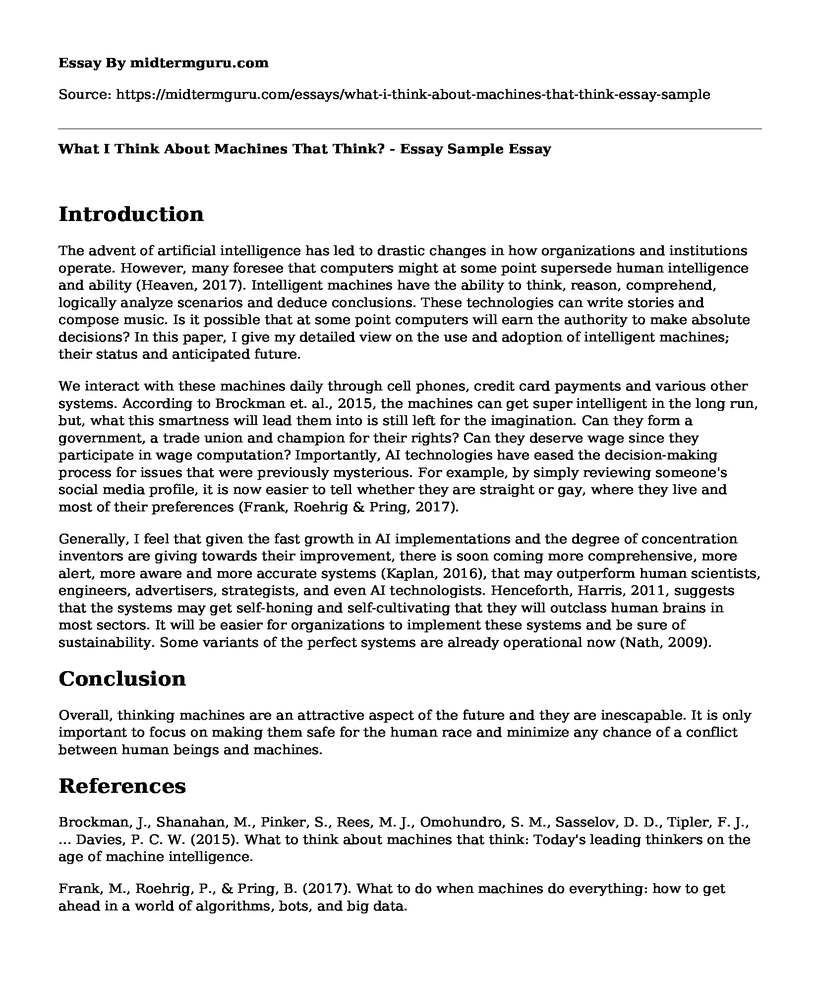Introduction
The advent of artificial intelligence has led to drastic changes in how organizations and institutions operate. However, many foresee that computers might at some point supersede human intelligence and ability (Heaven, 2017). Intelligent machines have the ability to think, reason, comprehend, logically analyze scenarios and deduce conclusions. These technologies can write stories and compose music. Is it possible that at some point computers will earn the authority to make absolute decisions? In this paper, I give my detailed view on the use and adoption of intelligent machines; their status and anticipated future.
We interact with these machines daily through cell phones, credit card payments and various other systems. According to Brockman et. al., 2015, the machines can get super intelligent in the long run, but, what this smartness will lead them into is still left for the imagination. Can they form a government, a trade union and champion for their rights? Can they deserve wage since they participate in wage computation? Importantly, AI technologies have eased the decision-making process for issues that were previously mysterious. For example, by simply reviewing someone's social media profile, it is now easier to tell whether they are straight or gay, where they live and most of their preferences (Frank, Roehrig & Pring, 2017).
Generally, I feel that given the fast growth in AI implementations and the degree of concentration inventors are giving towards their improvement, there is soon coming more comprehensive, more alert, more aware and more accurate systems (Kaplan, 2016), that may outperform human scientists, engineers, advertisers, strategists, and even AI technologists. Henceforth, Harris, 2011, suggests that the systems may get self-honing and self-cultivating that they will outclass human brains in most sectors. It will be easier for organizations to implement these systems and be sure of sustainability. Some variants of the perfect systems are already operational now (Nath, 2009).
Conclusion
Overall, thinking machines are an attractive aspect of the future and they are inescapable. It is only important to focus on making them safe for the human race and minimize any chance of a conflict between human beings and machines.
References
Brockman, J., Shanahan, M., Pinker, S., Rees, M. J., Omohundro, S. M., Sasselov, D. D., Tipler, F. J., ... Davies, P. C. W. (2015). What to think about machines that think: Today's leading thinkers on the age of machine intelligence.
Frank, M., Roehrig, P., & Pring, B. (2017). What to do when machines do everything: how to get ahead in a world of algorithms, bots, and big data.
Harris, M. C. (2011). Artificial intelligence. New York: Marshall Cavendish Benchmark.
Heaven, D. (2017). Machines that think: Everything you need to know about the coming age of artificial intelligence.
Kaplan, J. (2016). Artificial intelligence: What everyone needs to know.Nath, R. (2009). Philosophy of artificial intelligence: A critique of the mechanistic theory of mind. Boca Raton, Fla: Universal-Publishers.
Cite this page
What I Think About Machines That Think? - Essay Sample. (2022, Sep 15). Retrieved from https://midtermguru.com/essays/what-i-think-about-machines-that-think-essay-sample
If you are the original author of this essay and no longer wish to have it published on the midtermguru.com website, please click below to request its removal:
- Essay on Innovation Architecture of Organization and Management of Innovation
- Impact of AI on PR: Research Proposal
- Research Paper on Use of Surveillance Drones for Virtual City
- Robots Are Better Than Human - Argumentative Essay
- The Future of Energy - Essay Sample
- Innovation Management: Impact on Organization Performance & Tech Governance - Essay Sample
- Amazon: An Innovative Leader in Technology and E-Commerce - Essay Sample







